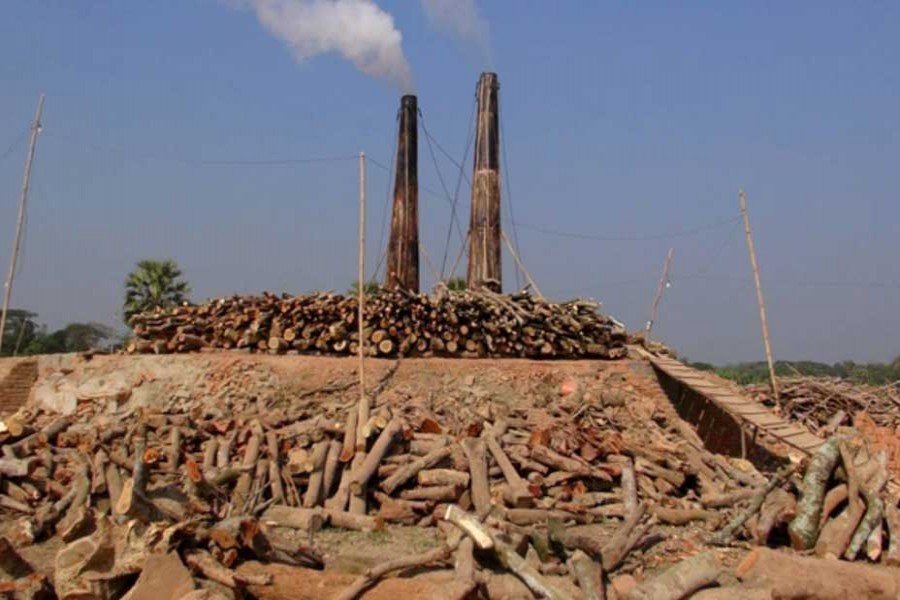A large number of brick kilns are still operating across the country illegally due to lax monitoring and supervision by the authorities concerned, putting harmful impacts on the environment and public health.
According to a latest report of Department of Environment (DoE), as many as 2,460 brick kilns out of 7,933 are running without approval or environmental clearances from the authorities concerned as of August 2019.
The official data also disclosed that the number of eco-friendly brick kilns witnessed a slight rise, though the government was encouraging brick makers to use eco-friendly technologies, including Hybrid Hoffman Kiln (HHK) and tunnel kiln to cut emissions of carbon dioxide and other environmental pollutants into the atmosphere.
Some 71.82 per cent of brickfields were set up using eco-friendly technologies in last one year since August 2018 while it was 71.36 per cent during the same period in the previous year, the data showed.
Nearly 18 per cent of brick kilns use forest wood defying the existing law, putting adverse impacts on the environment and agriculture, according to a recent study.
Soil Resource Development Institute (SRDI) under the Ministry of Agriculture conducted the study on a total of 118 brick kilns in 86 upazilas of 48 districts across the country in 2017.
The study revealed that chimneys of the surveyed brick kilns were not constructed as per government's specifications.
A senior DoE official said they seek more help from the district administration to go tough on errant brickfields.
"We need more manpower to address the issue properly," he told the FE.
Only 5,176 brick kilns had obtained approval from the government, according to the August 2019 data of the DoE.
Officials said illegal brickfields are still running, flouting the Brick Manufacturing and Brick Kilns Establishment (Control) Act-2013.
The law stipulates that an owner must renew a licence and clearance certificate.
At least 525 brick kilns are running illegally in Chattogram division while 300 in Khulna, 374 in Rangpur, 688 in Dhaka, 158 in Mymensingh and 300 in Rajshahi divisions.
Talking to the FE, DoE director Md Ziaul Haque said a large number of brick kilns are not getting licences as Brick Manufacturing and Brick Kilns Establishment (Control) Act 2013 does not allow them to operate those due to various reasons.
Brickfields cannot be built within specific distance from educational institutions, residential, business or protected areas, city corporations, municipality or upazila headquarters, public or private forests, environmental sanctuaries, gardens or wetlands, agricultural land, ecological crisis areas, or areas with high air pollution.
As the law has been amended, the director said, brickfield owners will now receive clearance soon.
"DoE is encouraging all concerned to make non-fired bricks without using topsoil of agricultural land and combat air pollution," Mr Haque said.
DoE is planning to reduce fired-brick production up to 30 per cent and increase green brick or block output to 70 per cent by 2028, he said.
To this end, a committee has been formed, he added.
Talking to the FE, Md Abu Bakar, secretary general of Bangladesh Brick Manufacturers' Association, said obtaining environmental clearances is still tough under the existing amended law as DoE has not yet finalised standard level of air pollution.
Many owners applied for environmental clearances a long time ago, but they are yet to get them. That's why others are getting discouraged to apply for the same, Mr Bakar said. He said it is required by the law to set up a brickfield in a specific location and distance. If air pollution remains at standard level, brick owners will get clearance, he added.
As many as 200 kilns are still using banned 'Bangla chimneys' or 'drum chimneys in remote areas of the country flouting the law, but the local administration remains silent, he claimed. Talking to the FE, Dr. M. Maksudur Rahman, geography professor at Dhaka University, said illegal brick kilns may have damaging impacts on public health, forest, agriculture and climate.
Non-fired bricks or blocks should be used to reduce air pollution while modern and eco-friendly technologies must be used to manufacture bricks, he said. The government should step up its monitoring and supervision to protect the environment and public health, Mr Rahman added.
"Our people are the worst-affected due to air pollution caused by illegal brick kilns," he observed.


